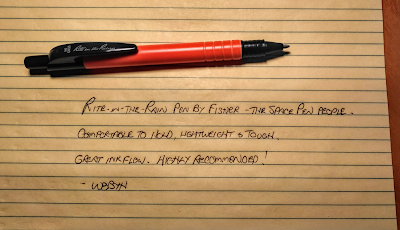I'm 66 years old - very much a child of the space-race era. I'm old enough to remember watching John Glenn launch into orbit. Just about everything that fascinated me as a kid was related to the exploration of space. The astronauts were my heroes and everything they used grabbed my interest. The rockets they rode on, the helmets they wore, the food they ate (based on what I heard and saw, it was all Tang and freeze dried ice cream), even the pens they wrote with. There was this thing called the Fischer Space Pen that the astronauts used. Apparently ink won't flow in a traditional ball point pen in zero gravity. Hmmm... what to use to write with?
In 1967 a guy named Paul Fisher developed a ball point pen with a sealed and pressurized (using nitrogen) ink cartridge. Fisher developed the pressurized cartridge in response to a NASA requirement for a pen that would write in zero gravity. So Paul Fisher came up with the pressurized ink cartridge, and it worked. The Fisher Space Pen has flown on every US manned space mission since Apollo 7 in 1968.
 |
| The original Space Pen - the model that first flew on Apollo 7 |
This is where we pause to dispel the persistent internet myth that NASA picked a million dollar solution for a one dollar problem - the Americans developed expensive space pens while the clever Russkies used simpler, cheaper and more reliable pencils. That's bullshit. While pencils were used in space by both sides, nobody liked them. The problem was, what happens to all the shavings and dust you create when you sharpen the pencil? It all starts floating around inside the capsule, can be accidentally inhaled by the astronauts, can short out switches, is flammable, and just makes a mess. Both the US and the Russians also tried using grease pencils and plastic slates, but neither solution made anyone happy. In fact, the Russians ended up buying Fisher's pens for their own manned space missions.
Fisher didn't invent a space 'pen'; he first invented a pressurized ink cartridge that could be used in just about any pen body. But Fisher saw the obvious market appeal of an officially adopted NASA pen and immediately started manufacturing the entire pen and selling it as the official Space Pen. They've been selling them under that name for half a century.
The Space Pen concept isn't just a good fit for zero gravity conditions. Because the ink is under pressure it will flow under a wide variety of conditions - very low temps, on wet paper (even under water), on greasy surfaces. That makes it an ideal pen for just general writing use.
As a kid I always wanted a Space Pen. It's what the astronauts used, right? But they were never cheap. Throughout my professional life I've used a truckload of pens. Literally, you could fill the bed of an F-150 with all the pens I've used down through the years. I was in a career field where I did a lot of writing. I went through hundreds, if not thousands, of pens and developed some strong preferences, particularly for the Cross models. I'm probably one of the few humans on the face of the planet that has actually used up all the ink in a ball point pen cartridge before losing the pen. Yup, I've actually run a lot of pen cartridges dry. But I've never used a Space Pen. Until...
A few weeks ago Roberta and I were shopping at the Fort Benning PX and I happened by a display for Rite-in-the-Rain products. I like their notebooks for use during things like POTA activations, so figured I'd grab a few extras. The display also featured some Rite-in-the-Rain ballpoint pens. I pulled one off the pegboard and read the back of the package. It's then I realized the pen is just a re-badged plastic body pen made by Fisher, and uses their famous pressurized Space Pen cartridge. At about $10 I figured it was worth a try.
To my delight, I've found this is a really great pen. The whole package works. The pen diameter is ideal and comfortable for me to hold in my somewhat cramped left-handed writing style. It's very light weight, but surprisingly well made with an excellent click mechanism. The ink flow is smooth and even. The ability to write in zero gravity aside, this is just a good pen.
So as you are planning your next POTA or SOTA expedition, and need a pen that won't fail even under some gnarly weather conditions, consider one of these Space Pens. If they were good enough for Apollo 7, they're good enough for you!
W8BYH out


No comments:
Post a Comment